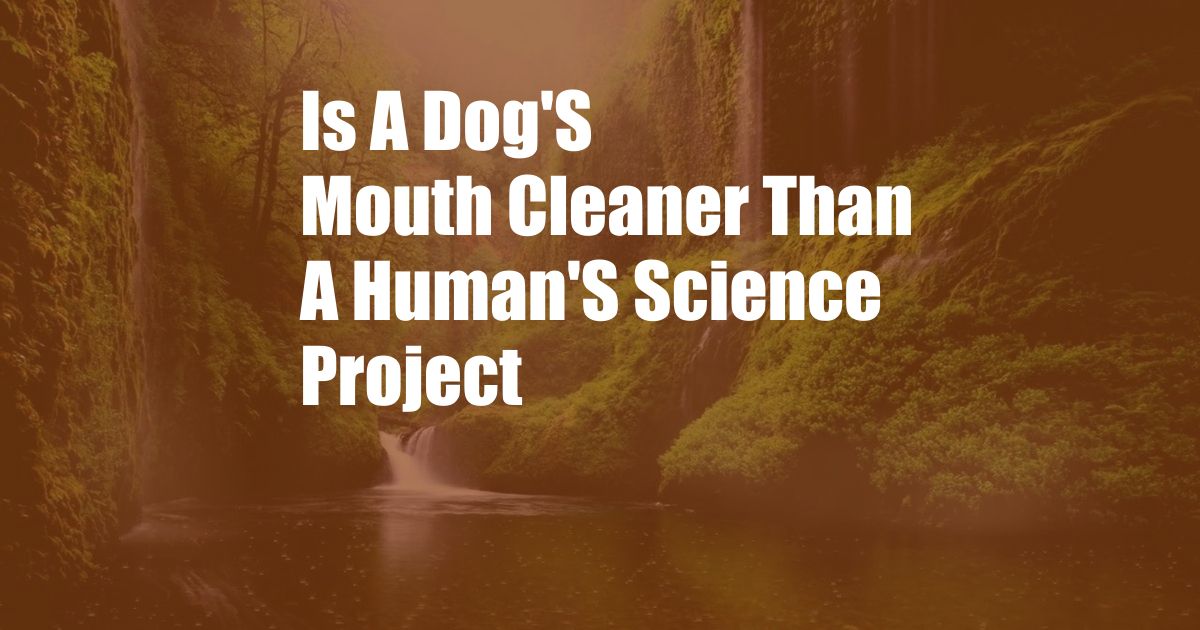
Is a Dog’s Mouth Cleaner Than a Human’s?
I grew up in a household with a beloved golden retriever named Bruno. Bruno was an affectionate and playful companion, but I never gave much thought to the cleanliness of his mouth. I assumed, like many people, that his mouth was dirtier than mine. It wasn’t until a conversation with my veterinarian that I discovered the truth: a dog’s mouth, in general, can be cleaner than a human’s.
This fascinating revelation sparked my curiosity, and I delved into research to understand the science behind this surprising claim.
The Anatomy of a Dog’s Mouth
A dog’s mouth is structured differently than a human’s in several ways. Their teeth are designed for tearing and chewing, giving them a different shape and arrangement. Additionally, dogs have a longer tongue that contains ridges and bumps, which help to remove bacteria and debris from their teeth.
Dogs also have a high saliva production rate. Saliva contains enzymes that have antibacterial and antiviral properties, helping to keep the mouth clean and reduce the risk of infection. Studies have shown that dog saliva can even inhibit the growth of harmful bacteria like Streptococcus mutans, which is responsible for tooth decay in humans.
The Microbiome of a Dog’s Mouth
The microbiome, a community of bacteria, viruses, and fungi, plays a significant role in oral health. In humans, the oral microbiome is dominated by species that can cause disease, such as Streptococcus mutans and Porphyromonas gingivalis. However, in dogs, the oral microbiome is more diverse and contains a higher proportion of beneficial bacteria.
These beneficial bacteria help to protect against harmful bacteria by competing for resources and producing antimicrobial substances. They also contribute to the overall health of the dog’s immune system.
Factors Affecting Mouth Cleanliness
While dogs’ mouths can be cleaner than humans’ in general, there are factors that can affect the cleanliness of a dog’s mouth. These include:
- Diet: A healthy diet can help to maintain a healthy oral microbiome. Foods that are high in fiber and low in sugar can help to remove plaque and bacteria from the teeth.
- Dental hygiene: Regular brushing and dental care can help to remove plaque and tartar and reduce the risk of gum disease.
- Overall health: A dog’s overall health can affect the health of its mouth. Conditions like diabetes and kidney disease can lead to increased bacteria in the mouth.
Tips for Keeping Your Dog’s Mouth Clean
To keep your dog’s mouth clean and healthy, follow these tips:
- Brush your dog’s teeth regularly: Use a dog-specific toothbrush and toothpaste to gently remove plaque and bacteria from your dog’s teeth.
- Offer dental chews: Dental chews can help to remove plaque and tartar from your dog’s teeth and freshen their breath.
- Provide a healthy diet: Feed your dog a diet that is high in fiber and low in sugar to help maintain a healthy oral microbiome.
- Schedule regular dental checkups: Take your dog to the veterinarian for regular dental checkups to assess the health of their teeth and gums and identify any potential problems.
By following these tips, you can help to keep your dog’s mouth clean and healthy and prevent the development of dental problems.
FAQ
- Q: Why is dog saliva sometimes foamy?
A: Dog saliva is foamy due to the presence of mucins, which are proteins that help to protect the teeth and gums. - Q: Can dogs get cavities?
A: Yes, dogs can get cavities, but they are less common than in humans. - Q: How often should I brush my dog’s teeth?
A: It is recommended to brush your dog’s teeth at least twice a week. - Q: Can I use human toothpaste on my dog?
A: No, human toothpaste contains ingredients like fluoride that can be harmful to dogs.
Conclusion
While it may seem surprising, a dog’s mouth can be cleaner than a human’s. This is due to their different anatomy, microbiome, and overall health. However, it is important to maintain good dental hygiene practices for your dog to keep their mouth healthy and prevent the development of dental problems. Are you interested in learning more about the topic discussed?